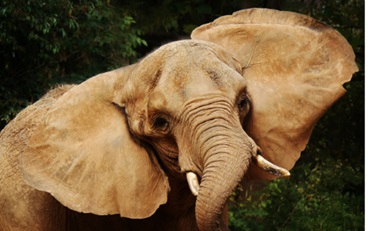Super Senses of Animals
1) Why Is the Sense of Smell in Dogs Well-Developed?
The sense of smell in dogs is well-developed due to the following reasons—
- They have around 300 million olfactory receptors, i.e., cells that sense smell in the nose lining.
- The part of the brain that controls the sense of smell is 40 times larger in dogs than in humans.
2) What Enables an Elephant To Hear the Faintest Sound From Far Distances?
- The function of the external ear is to gather sound waves from the surroundings.
- The large external ears in elephants help them to gather sound waves from a distance and hear the faintest sounds around.

3) Why Do You Think Mosquito Repellent Creams Have a Strong Odour?
- Mosquitoes identify their host with the help of the odour of carbon dioxide they release.
- Mosquito repellents are purposely provided with a strong odour to overpower the smell of carbon dioxide and keep us away from mosquitoes.
4) Whiskers Enable a Tiger To Know About the Slightest Change Around It. Do You Think the Whiskers Work Like a Sense Organ?
- Yes, whiskers work like sense organs. They are adapted to sense every small change happening in the surroundings. They receive the external stimulus, which generates a nerve impulse as it occurs in the case of sense organs.
- This nerve impulse is then sent to the brain, and the animal acts as the brain commands.

5) Why Do You Think Rabbits Have Long Ears?
Rabbits have long ears, and these help them in the following ways—
- The ears help detect the faintest sounds in the surroundings.
- They help the rabbits to regulate their body temperatures. The body's heat is lost via the ears when it becomes too hot.

Share

